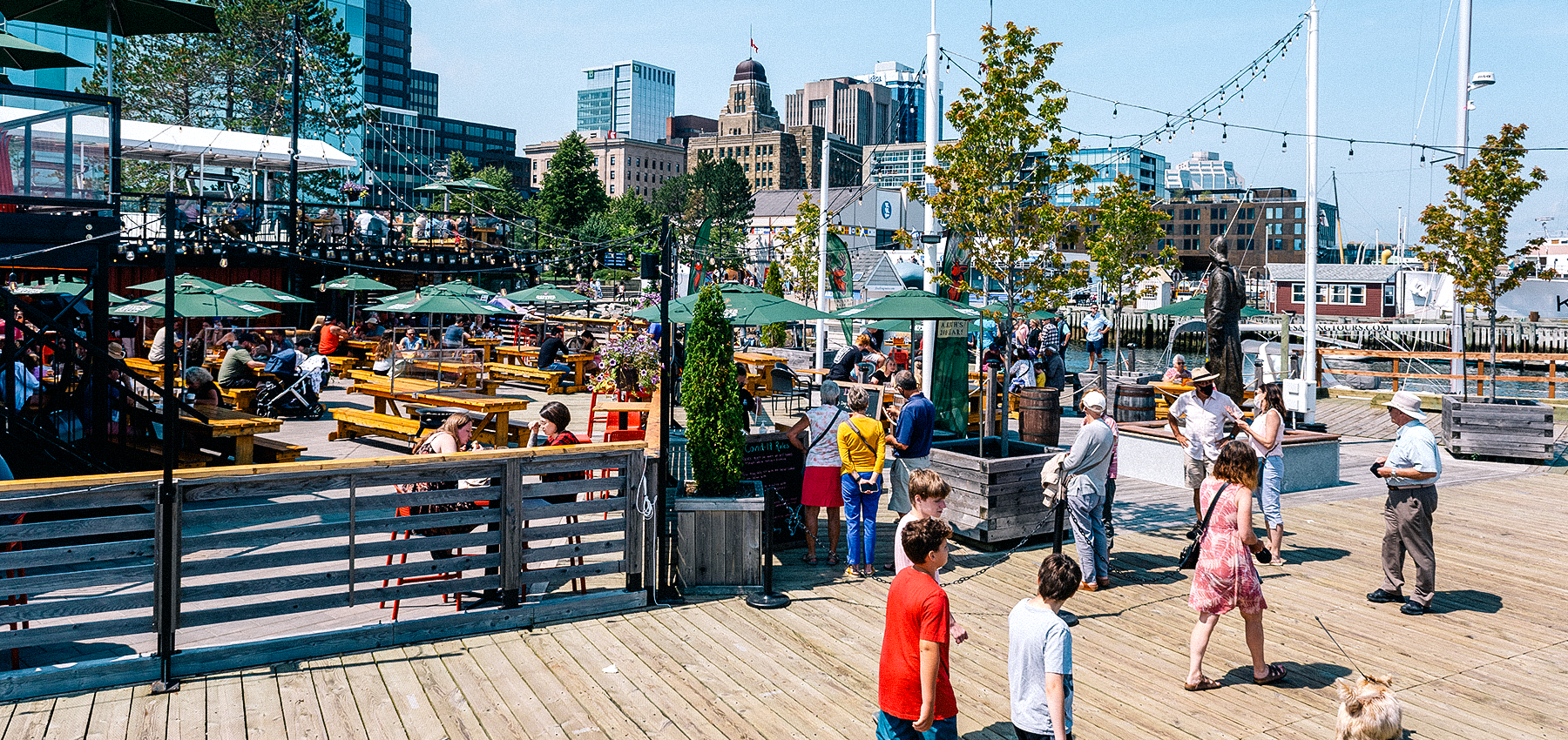Choosing a city to settle in is one of the most important decisions you’ll make as a newcomer moving to Canada. Newcomers are often attracted to major cities since they offer a good quality of life, established job markets, cultural diversity, and inclusive environments. Halifax, Nova Scotia checks all these boxes and offers many benefits typical of metropolitan living, but at a significantly lower cost of living compared to cities like Toronto and Vancouver. This makes it a popular destination for newcomers.
In this article, we cover key aspects of living in Halifax as a newcomer, including the area’s culture, job market, weather, transit system, and more.
In this article:
- About Halifax
- Weather in Halifax
- Culture and languages in Halifax
- The job market in Halifax
- Renting accommodation in Halifax
- Transportation in Halifax
- The education system in Halifax
- Health care in Halifax
- Immigrating to Halifax, Manitoba
- Is Halifax, Nova Scotia a good place to live as a newcomer?
About Halifax
Halifax is the capital city of Nova Scotia, which is located on the east coast of Canada on the Atlantic Ocean. Nova Scotia is part of the Maritimes (which includes the provinces of New Brunswick and Prince Edward Island) and is surrounded by sea, except for a land boundary shared with New Brunswick. Geographically, Halifax covers an area of 97 square kilometres and, according to the 2021 census, has a population of 439,819.
The Halifax Regional Municipality (HRM) consists of Halifax, Dartmouth, the former Halifax County, and Bedford areas. Nearly 40 per cent of the population of Nova Scotia resides in the HRM.
Halifax is a growing city with a diverse population that welcomes newcomers and offers a slower-paced lifestyle, natural surroundings, and good quality of life.
Weather in Halifax
Halifax’s climate features all four seasons: spring, summer, winter, and fall. Compared to other Canadian cities, however, its weather is less extreme.
Winters last from November to March with temperatures rarely falling below -10° C. This season also brings strong winds, heavy snowfall, and freezing rain. Preparing for winter with proper outerwear is essential for newcomers living in Halifax. Summer in Halifax is warm with temperatures as high as 25° C in June, July, and August. It’s also not unusual to experience fog while living here.
Culture and languages in Halifax
Halifax is the most multicultural city in Nova Scotia with a mix of ethnicities, cultures, and languages that make it a welcoming place for newcomers. In 2021, immigration contributed to more than 63 per cent of the city’s population growth. Moreover, Nova Scotia aims to double its population to two million by 2060, with a goal of attracting 25,000 newcomers per year.
Along with its official languages of English and French, over 100 languages are spoken in Halifax. Its residents are from all over the world, including countries like India, the Philippines, China, South Korea, and Nigeria.
As a newcomer to Halifax, you can find many ways to connect with your roots through cultural communities, settlement agencies, local shops, events, and restaurants that reflect the city’s diversity.
The job market in Halifax
Read our article about in-demand jobs in Nova Scotia to get key insights into industries and cities with the most employment opportunities. You can also download our job market guide to learn more about the scope of your occupation in Canada. |
As Nova Scotia’s largest urban centre, Halifax offers job opportunities that span many industries, with 85 per cent of all jobs in the province located in the HRM. As of March 2022, the unemployment rate in Halifax is 5.4 per cent.
The city is home to one of the country’s fastest-growing information and technology (ICT) hubs. Additional industries include the service sector, gaming and digital media, financial services, ocean technology, construction, transportation and logistics, fishing, and health and life sciences. Halifax is at the centre of Canada’s Ocean Supercluster which focuses on innovation and commercialization that drives economic growth from the ocean.
Renting accommodation in Halifax
Compared to many major cities across Canada, Halifax provides affordable options for renting and buying. However, before locking into a lease, you may want to book temporary accommodations for your first few weeks in Canada while you decide where you want to live on a more permanent basis. With many urban, rural, and suburban neighbourhoods across the HRM, it may take some time to explore the area to determine the best location.
Buying a house is more affordable in Halifax than in many of Canada’s large cities. You can use a site like Houseful to browse properties for sale in Halifax and the surrounding area. However, many newcomers rent accommodations for a few years to accumulate savings for a down payment to buy a home. If you decide to rent, Halifax offers a range of rental housing options including apartments, basement apartments, condos, townhouses, semi-detached, and detached houses.
Rental prices in Halifax are more affordable than in other Canadian urban centres. The median cost to rent a one-bedroom apartment is $1,300, while a two-bedroom apartment averages $1,606.
When signing the lease, the landlord may require an employment letter or a Canadian credit history. There are other options available if you are unable to provide these. Read our article on how to rent an apartment with no job letter or credit history for more information. Be sure to understand your rights as a tenant before you sign a rental agreement.
Transportation in Halifax
In Halifax, many residents rely on public transportation to travel within the city and across the region. Halifax Transit offers connections between its bus transportation and ferry service. Ferry services are available between Halifax and downtown Dartmouth, as well as between Halifax and Woodside.
You can purchase Halifax Transit tickets and monthly passes at select retailers or when you board using exact change. The HRM also offers an infrastructure of sidewalks, walkways, and multi-use pathways for walking and cycling.
If you don’t live in a central location, driving a car might make it easier to get around. To buy or lease a car and drive in Halifax, you’ll need to get a Nova Scotia driver’s license. Nova Scotia has a three-step graduated driver’s licensing system. If you have a valid driver’s license from a country other than Canada, you can drive a passenger vehicle with your license for up to three months.
The education system in Halifax
Sending your children to school in Halifax
Halifax offers free public schooling, as well as fee-based private schools. Most residents send their children to public schools. As part of the Nova Scotia school system, the Halifax Regional Centre for Education operates 135 English public schools in the HRM, serving 53,000 students. In addition, Halifax offers four French language schools for students from Kindergarten to Grade 12, operated by the Conseil scolaire acadien provincial (CSAP).
Children can begin Kindergarten at the age of five years old in elementary school. After finishing Grade six, they continue to Junior High School for grades seven to nine. Students in Grades 10, 11, and 12 enrol in Senior High School. You can register your child at the local school they will be attending or at the regional school board office.
As a newcomer student, your child may receive English as an Additional Language (EAL) programming to help them better adapt to their new school and improve their English language skills. You can also enrol your child in English as a second language (ESL) programs offered by the provincial government or look for ESL resources for children at your local public library.
Higher education in Halifax
Halifax has several higher education institutions, including renowned universities and colleges. Dalhousie University, which has three campuses in Halifax, ranks among the best universities in Canada.
Additional universities in the region include Saint Mary’s University, University of King’s College (which is academically integrated with Dalhousie University), Mount Saint Vincent University, and Nova Scotia College of Art and Design University. Students can also enrol in study programs offered by Nova Scotia Community College, which has three campuses in HRM.
Health care in Halifax
As a Canadian permanent resident or citizen living in Halifax, you qualify for publicly-funded health care through the provincial government’s Medical Services Insurance Program. You can apply for a Nova Scotia Health card when you arrive, however, your health coverage will not begin until the first day of the third month after your arrival. If possible, plan ahead and purchase private health insurance to cover you for your initial months in Halifax.
Newcomers to Halifax have access to a wide range of clinics and doctors’ offices that provide health care services. There are also four hospitals that serve the HRM: Queen Elizabeth II Health Sciences Centre (QEII) which has two sites: the Halifax Infirmary (HI) and the Victoria General (VG). Additional hospitals are IWK Health Centre, and Cobequid Community Health Centre.
To find a family doctor in Halifax, visit the Need a Family Practice Registry. The Nova Scotia Health Authority will contact you when a health care provider in your area is accepting new patients. For more specialized health needs, your family doctor can refer you to a specialist.
Immigrating to Halifax, Nova Scotia
Newcomers wishing to start a new life in Nova Scotia may be eligible to apply for permanent residence (PR) through Express Entry, the Nova Scotia Provincial Nominee Program (NSPNP), or the Atlantic Immigration Program (AIP).
The Nova Scotia Provincial Nominee Program is designed to accelerate the immigration process for skilled workers, students, and entrepreneurs who can contribute to Nova Scotia’s economy. The Atlantic Immigration Program (AIP) is a federal immigration program that allows skilled foreign workers with a valid job offer and international students who’ve studied in Canada to permanently settle and work in one of Canada’s four Atlantic provinces.
Is Halifax, Nova Scotia a good place to live as a newcomer?
Newcomers choose Halifax as their new home for a variety of reasons, including its culturally diverse community, affordable cost of living, employment opportunities, seaside living, and good quality of life.
As the most diverse city in the Atlantic provinces, Halifax welcomes newcomers from across the globe and offers many opportunities to stay in touch with your cultural roots while you build your life in Canada.







